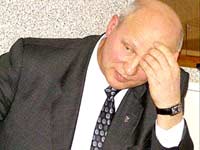 Today, a court in Minsk sentenced Belarus opposition leader and former presidential candidate Alyaksandr Kozulin to five and a half years' imprisonment, according to his wife. Kozulin was charged with organising protests in March against the reelection of Alyaksandr Lukashenka as president of Belarus. Lukashenka received some 83% of votes, which provoked widespread public protests and demonstrations.
Today, a court in Minsk sentenced Belarus opposition leader and former presidential candidate Alyaksandr Kozulin to five and a half years' imprisonment, according to his wife. Kozulin was charged with organising protests in March against the reelection of Alyaksandr Lukashenka as president of Belarus. Lukashenka received some 83% of votes, which provoked widespread public protests and demonstrations.The now sentenced Kozulin remains somewhat of an enigma to most analysts. In contrast to the other presidential candidate, Alyaksandr Milinkevich, Kozulin unexpectedly appeared as a candidate at a late stage of the runup to the March elections. His populism and provocative slandering of president Lukashenka was something new to Belarus politics. Many also wondered why he was allowed to attack the president on state TV, which is strictly controlled by the regime.
The initial assumption was that the regime had Kozulin run for the presidency in order to split the opposition. A more likely explanation is that he was Moscow's man. Accordingly, Russia would have used Kozulin to replace the increasingly difficult Lukashenka. Such assumptions are supported by an apparent power struggle within the regime in connection to the elections.
Thus, it seems that Lukashenka might just have averted being ousted from office by political forces allied with Moscow. His disappearance from the public after elections and the postponement of the presidential inauguration are further circumstantial evidence of a power struggle. That Belarus authorities now crack down so hard on Kozulin would serve as the final confirmation of the Russian connection. However, as is often the case with authoritarian regimes, one should be careful with taking rumours for granted. What is obvious is the increasing desperation of the Lukashenka regime to hold on to its grip on power.




No comments:
Post a Comment